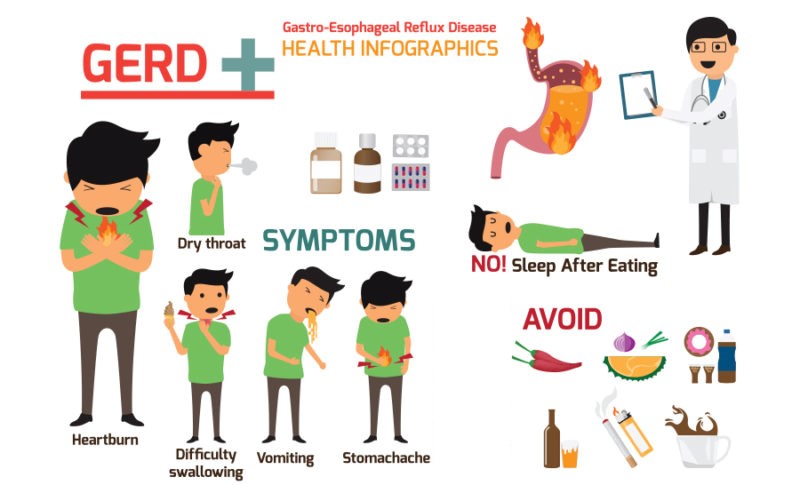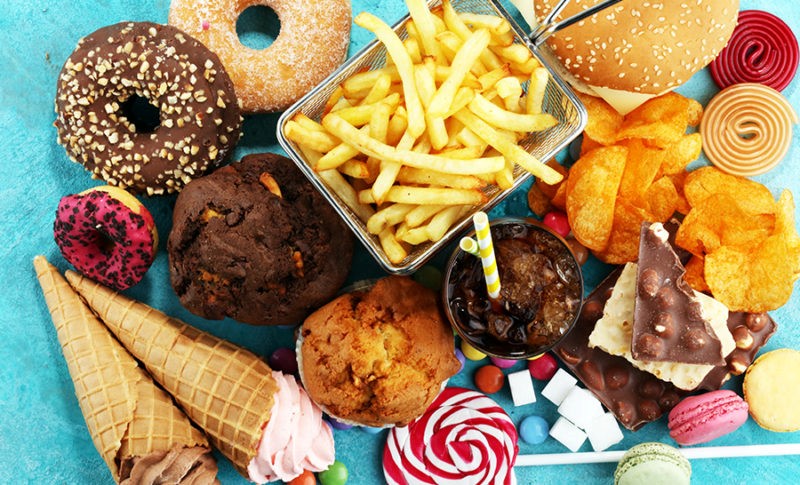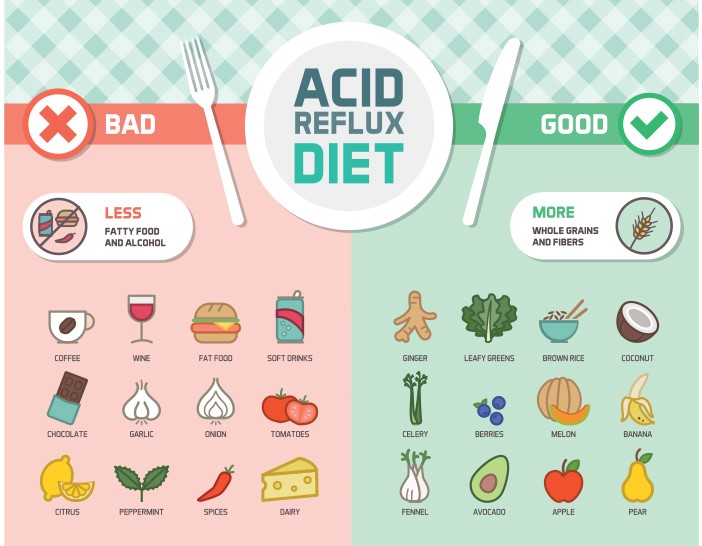GERD Diet – In a Glance
The best foods to eat if you have Gastroesophageal Reflux Disease (GERD) include lean meats, vegetables and good fats. The worst foods for people with GERD include spicy foods, caffeine, saturated and trans fats, and even chocolate.
What Causes GERD? | Foods To Avoid | Foods To Consume | Habits & Lifestyle | Key Takeaways | FAQs
Had some spicy curry and now you’ve got a heartburn? Well, if it happens once in a blue moon, this is nothing to worry about. In fact, the heartburn will go away with some over-the-counter medication.
But GERD is a serious, chronic condition that requires proper care and treatment. In fact, according to studies, 20% of Americans suffer from it.
What Causes GERD?

GERD, or in simple words, acid reflux, occurs when your stomach acid goes the wrong way up your esophagus (food pipe). When this occurs, you’re going to feel a heartburn, irritation in your throat and other uncomfortable sensations.
The lower esophageal sphincter (which is a valve) prevents the food and acid in your stomach from going back up into your food pipe. But if this valve is damage, it won’t be able to.
GERD occurs when this lower esophageal doesn’t properly close, letting the acid flow back into your food pipe.
Of course, there’s always something you can do to manage GERD and keep your body healthy. This includes consuming a GERD diet so you don’t have to suffer from heartburn over and over.
“Diet plays a major role in controlling acid reflux symptoms and is the first line of therapy used for people with GERD,” claims Ekta Gupta, a gastroenterologist at Johns Hopkins Medicine.
Because GERD is a digestive disorder, food plays a huge role in its mechanism. A GERD diet is one of the best ways to treat GERD.
Learn gut health hacks for a healthy digestive system.
GERD Diet: Foods To Avoid

It is important to avoid foods that cause the esophageal sphincter to relax, which pushes the food upwards leading to acid reflux. Your GERD diet seeks to minimize foods that cause this muscle to relax and foods that create acid in the stomach.
Here’s what you should avoid:
High-Fat Foods
Foods with high contents of fat can cause two problems for GERD patients. One, it relaxes the muscle we mentioned above which causes food to back up in the esophagus. Second, these foods also take more time to empty from the stomach.
Eliminating high-fat foods from your GERD diet can help you reduce acid reflux. An example of these foods is:
- Fried foods
- Fast food
- Pizza
- Packaged chips
- Bacon and sausage
- Fried beef, pork or lamb
- Fat from lard, bacon or ham
- Gravies and cream sauces
- High fat dairy products such as butter, cheese and creams
Citrus Fruit
High acidic fruits are actually a no-go for GERD diet. They increase the contents of acid in the stomach during digestion.
Avoid these fruits and vegetables because of their high acidity.
- Oranges
- Lemons
- Pineapples
- Tomatoes and tomato sauces (including pizza sauce)
- Grapefruit
Other Foods
The goal of your GERD diet is to cut back on the foods that increase stomach acid during digestion or relax the esophagus muscles, which push the food back up in your food pipe.
Some of the foods include:
- Chocolate has an ingredient called methylxanthine. This chemical plays a role in relaxing the sphincters in the LES.
- Garlic
- Onions
- Spicy foods
- Caffeine
- Mint
- Carbonated beverages
There are no studies that prove that these foods reduce GERD symptoms. However, according t people’s experiences and healthcare professionals’ advice, these are the foods that result in GERD.
Dr Gupta says, “moderation is key since many people may not be able to or want to completely eliminate these foods”.
Learn how to make low fat desserts so you can still enjoy your fav foods!
GERD Diet: Foods To Consume

You might think you’ve run out of all your options. But truth is, you should avoid those foods anyway – or at least consume in moderation.
This is not the end of the foods you can have though – there are plenty of foods you can still add to your GERD diet. The goal of a GERD diet is to help restore the natural bacterial flora of the gut. A study showed that the following foods help in reducing GERD symptoms:
High Fiber Foods
To balance the pH levels of your gut, you need high fiber foods such as:
- Whole grains: oatmeal, brown rice, oats and quinoa
- Fruits with high fiber: berries, apples, bananas, melons, peaches and pears
- Vegetables: asparagus, green beans, carrots, beets, sweet potatoes and broccoli
Lean Meat and Seafood
While you should avoid meats with high fat such as red meats, you should consume lean meats instead. This includes:
- Chicken
- Turkey
- Fish
- Seafood such salmon and trout
Healthy Fats
While cutting out high-fat foods, you still need good fats in your diet. Try getting your dose of healthy fats from:
- Avocados
- Walnuts
- Flaxseed
- Olive, sesame or sunflower oil
Alkaline Foods
Foods with low pH levels are highly acidic and result in acid reflux. This is why you should consume alkaline foods. They’re higher in pH and can help balance stomach acid. A few examples of alkaline foods are:
- Bananas
- Melons
- Cauliflower
- Fennel
- Nuts
Probiotics
Probiotics can help restore the natural bacterial flora in the intestines and gut. Also, they help in reducing digestive issues by balancing your digestive system. These foods contain natural probiotics:
- Yogurt
- Kombucha
- Raw Kimchi
- Kefir
- Fermented pickles and vegetables
Check out these 5 gluten-free snacks to eat.
Habits & Lifestyle – Transition to Healthy Living

Apart from incorporating a GERD diet in to your life, there are other changes you can make to minimize GERD symptoms.
According to Dr. Gupta, “try to avoid eating problem foods late in the evening closer to bedtime, so they are not sitting in your stomach and then coming up your esophagus when you lay down at night. It’s also a good idea to eat small frequent meals instead of bigger, heavier meals and avoid late-night dinners and bedtime snacks.”
To manage GERD and minimize its irritating, uncomfortable symptoms, you should:
- Quit smoking
- Avoid wearing tight clothing and belts
- Keep a healthy weight
- Sit straight after eating for at least an hour
- Raise your head while sleeping
- Exercise by combining strength training, HIIT and Yoga
Key Takeaways
If you suffer from a painful sensation in the chest with recurring acid reflux, then applying a GERD diet in your life can be the cure. Managing GERD immensely depends on your diet such as opting a low fat diet, habits and lifestyle choices.
By combining healthy eating patterns and an active lifestyle, you can control your GERD and enjoy a pain-free life.
FAQs
The best foods for managing your GERD are those easy on your digestive system and don’t trigger your acid reflux. This includes lean meats such as fish, chicken and turkey. You should also consume fiber-rich foods such as oatmeal, quinoa, brown rice, oats, etc. You should also veggies like green beans, sweet potatoes cauliflower and carrots along with fruits such as melons, fennels and bananas. It is also okay to consume good fats such as nuts, yogurt, olive oil and nuts.
Yes, you can eat eggs with GERD. However, you have to be careful about the way you eat them. Egg whites are low in fats and rich in protein, which makes them great for your overall health. This also makes them GERD diet friendly. But, before you eat eggs with GERD, remove the yolks. This is because yolks are fat-rich and might trigger your acid reflux.
Fasting can have mixed results on your GERD. There can be two types of results. On one hand, fasting can lead to lesser contents in your stomach, reducing the chances of acid reflux. Since your stomach will be empty, there won’t be any acid that’s pushed back and up your food pipe.
But this may not always be the case. In fact, fasting can trigger acid reflux in your body. If your stomach is empty for too long, it might overproduce acid. This increases the chances of acid reflux when you do start eating.
Some people might overeat or binge when they break their fast. This can adversely impact your GERD symptoms. Everyone’s body is different so make sure you observe how your body responds to fasting.
Yes, yogurt is good for GERD. However, it depends on the type of yogurt you’re eating. If you’re consuming low-fat or non-fat yogurt, then its great for your GERD. This is because yogurt is gentle on your stomach, which soothes the acid reflux. It is also rich in probiotics, which balances the gut flora.
On the other hand, flavored yogurts, high-fat yogurts or yogurts with artificial sweeteners can trigger your GERD symptoms. So, make sure you’re consuming the right kind of yogurt!
Read More From SQUATWOLF









